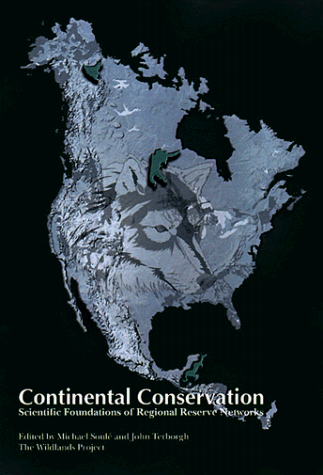Articoli correlati a Continental Conservation: Scientific Foundations of...

The Wildlands Project is a far-reaching effort by scientists and activists to develop better ways of protecting nature, wilderness, and biodiversity. Its ultimate goal is to establish an effective network of nature reserves throughout North America -- core conservation areas linked by corridors, and buffered, where appropriate, by lands that may also serve economic objectives.Continental Conservation represents the work of thirty leading experts-including Michael Soulé, John Terborgh, Reed Noss, Paul Paquet, Dan Simberloff, Rodolfo Dirzo, J. Michael Scott, Andrew Dobson, and others -- brought together by The Wildlands Project to examine the science underlying the design and management of these regional-scale networks. It provides conservationists and biologists with the latest scientific principles for protecting living nature at spatial scales that encompass entire regions and continents.Following an opening chapter that sets the stage by introducing major themes and the scientific and policy background, the contributors: consider scale in the identification, selection, and design of biological reserves examine the role of top carnivores in regulating terrestrial ecosystems suggest the need for a paradigm shift in the field of ecological restoration consider the scientific details of implementing regional conservation in core areas, corridors, and in buffer zones discuss the need for megareserves and how to design themThe book ends by challenging the reader, whether scientist or advocate, to commit more time to the effort of saving nature. The authors argue that the very survival of nature is at stake, and scientists can no longer afford to stand behind a wall of austere objectivity.Continental Conservation is an important guidebook that can serve a vital role in helping fashion a radically honest, scientifically rigorous land-use agenda. It will be required reading for scientists and professionals at all levels involved with ecosystem and land management.
Le informazioni nella sezione "Riassunto" possono far riferimento a edizioni diverse di questo titolo.
Product Description:
Book by None
Le informazioni nella sezione "Su questo libro" possono far riferimento a edizioni diverse di questo titolo.
- EditoreIsland Pr
- Data di pubblicazione1999
- ISBN 10 1559636971
- ISBN 13 9781559636971
- RilegaturaCopertina rigida
- Numero di pagine227
- RedattoreSoule Michael E., Terborgh John
- Valutazione libreria
Compra usato
Condizioni: molto buonoVery Good - Crisp, clean, unread... Scopri di più su questo articolo
EUR 36,20
Spese di spedizione:
EUR 5,58
In U.S.A.
I migliori risultati di ricerca su AbeBooks
Continental Conservation: Scientific Foundations Of Regional Reserve Networks
Editore:
Island Press
(1999)
ISBN 10: 1559636971
ISBN 13: 9781559636971
Antico o usato
Rilegato
Quantità: 1
Da:
Valutazione libreria
Descrizione libro Hardcover. Condizione: Very Good. Very Good - Crisp, clean, unread book with some shelfwear/edgewear, may have a remainder mark - NICE Standard-sized. Codice articolo M1559636971Z2
Compra usato
EUR 36,20
Convertire valuta

